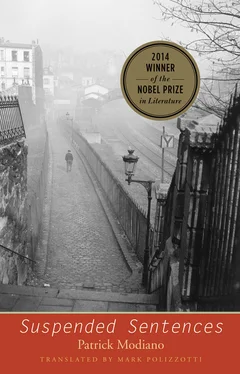Jean D. came to the house more often than the others. Annie always brought him in her 4CV. He had lunch with us and always sat next to Annie, at the large dining room table. Mathilde called him “my little Jean,” and she didn’t show the same reserve with him as she did with the other visitors. He called Little Hélène “Linou”—the same as Mathilde did. He always said, “How’s it going, Linou?”—and he called me “Patoche,” like Annie.
He lent my brother and me his watch. We were able to wear it, taking turns, for a whole week. The leather strap was too big, so he made another hole in it to keep it tight around our wrists. I wore that watch to the Jeanne d’Arc school and showed it off to the schoolmates huddled around me in the playground that day. Maybe the principal noticed that huge watch on my wrist, and saw me from her window getting out of Roger Vincent’s American car … Then she thought that was quite enough of that and that my place was not at the Jeanne d’Arc school.
“What sort of books do you read?” Jean D. asked me one day.
They were all having coffee in the living room after lunch: Annie, Mathilde, Little Hélène, and Snow White. It was a Thursday. We were waiting for Frede, who was supposed to arrive with her nephew. We had decided, my brother and I, to venture into the great hall of the chateau that afternoon, as we’d already done with my father. The presence of Frede’s nephew at our sides would bolster our courage.
“Patoche reads a ton,” answered Annie. “Isn’t that so, Snow White?”
“He reads way too much for his age,” said Snow White.
My brother and I had dipped a lump of sugar into Annie’s coffee cup and crunched it, as our ceremony required. Afterward, when they’d finished their coffee, Mathilde would read their future in the empty cups—“in the dregs,” as she said.
“So what do you read?” asked Jean D.
I told him adventure stories: Jules Verne, The Last of the Mohicans … but I preferred The Three Musketeers because of the fleur de lys on Milady’s shoulder.
“You should read pulps,” said Jean D.
“Jean, you’re crazy,” said Annie, laughing. “Patoche is way too young for pulps …”
“He’s got plenty of time ahead of him to read pulps,” said Little Hélène.
Apparently, neither Mathilde nor Snow White knew what “pulps” were. They kept silent.
A few days later, he returned to the house in Annie’s 4CV. It was raining that late afternoon, and Jean D. was wearing a fur-lined coat called a “Canadienne.” My brother and I were listening to the radio, both seated at the dining room table, and when we saw him come in with Annie, we got up to greet him.
“Here,” said Jean D., “I brought you a pulp …”
He took a black-and-yellow-covered book from the pocket of his jacket and handed it to me.
“Pay no attention, Patoche,” said Annie. “He’s just joking. That’s not a book for you …”
Jean D. looked at me with his slightly widened eyes, his sad, tender gaze. At certain moments, I had the sense that he was a child, like us. Annie often spoke to him in the same tone she used with us.
“No, seriously …” said Jean D. “I’m sure you’ll like this book.”
I took it so as not to hurt his feelings. Still today, whenever I come across one of the black-and-yellow covers of the Série Noire, a deep, slightly drawling voice echoes in my head, the voice of Jean D., who that evening repeated to me and my brother the title written on the book he’d given us: Don’t Touch the Loot .
Was it the same day? It was raining. We had accompanied Snow White to the news dealer’s because she wanted to buy some stationery. When we left the house, Annie and Jean D. were both sitting in the 4CV, parked in front of the door. They were talking and were so absorbed in their conversation that they didn’t see us, even though I waved at them. Jean D. had pulled the collar of his Canadienne up around his neck. When we returned, they were still in the 4CV. I leaned toward them, but they didn’t even look. They were talking and they both had serious faces.
Little Hélène was playing solitaire on the dining room table and listening to the radio. Mathilde must have been in her bedroom. My brother and I went up to ours. Through the window, I watched the 4CV in the rain. They stayed in it, talking, all the way to dinnertime. What secrets could they have been sharing?
Roger Vincent and Jean D. often came for dinner at the house, along with Andrée K. Other guests arrived after dinner. On those evenings, they all stayed in the living room until very late. From our bedroom we could hear shouts and bursts of laughter. And the phone ringing. And the doorbell. We ate dinner at seven-thirty in the kitchen, with Snow White. The dining room table was already set for Roger Vincent, Jean D., Andrée K., Annie, Mathilde, and Little Hélène. Little Hélène cooked for them, and they all said she was “a real cordon bleu.”
Before going up to bed, we went into the living room to say good night. We were in our pajamas and bathrobes — two plaid flannel bathrobes that Annie had given us as presents.
The others would join them later in the evening. I couldn’t help watching them, through the slats of the blinds in our room, once Snow White had turned out the lights and wished us good night. They came, one by one, and rang at the door. I could easily see their faces under the bright light of the bulb above the porch. Some of them have been engraved indelibly in my memory. And I’m amazed the police never questioned me: children see things, after all. They also hear things.
“You have very handsome bathrobes,” said Roger Vincent.
And he smiled.
We first shook Andrée K.’s hand, who always sat on the chair with the flowered upholstery next to the telephone. People called her while she was at the house. Little Hélène, who usually picked up, would say:
“Andrée, it’s for you …”
Andrée K. stretched out her arm to us nonchalantly. She smiled, too, but her smile didn’t last as long as Roger Vincent’s.
“Good night, children.”
She had freckles on her face, prominent cheekbones, green eyes, and light brown hair cut in bangs. She smoked a lot.
We shook Roger Vincent’s hand, who was always smiling. Then Jean D.’s. We kissed Annie and Little Hélène good night. Before leaving the living room with Snow White, Roger Vincent complimented us again on the elegance of our bathrobes.
We were at the foot of the stairs when Jean D. stuck his head through the half-open door to the living room.
“Sleep tight.”
He looked at us with his tender, slightly widened eyes. He gave us a wink and said in a lower voice, as if it were our secret:
“Don’t touch the loot.”
One Thursday, Snow White took a day off. She had gone to visit family in Paris and had left with Annie and Mathilde after lunch, in the 4CV. We stayed home in the care of Little Hélène. We were playing in the garden at setting up a canvas tent Annie had given me for my last birthday. Around midafternoon, Roger Vincent came by, alone. He and Little Hélène talked together in the courtyard of the house, but I couldn’t hear what they were saying. Little Hélène told us she had to run an errand in Versailles and asked us to come with them.
We were thrilled to ride in Roger Vincent’s American car again. It was April, during Easter vacation. Little Hélène sat in front. She was wearing her riding breeches and her cowboy jacket. We were sitting on the huge back seat, my brother and I, and our feet didn’t reach the floor of the car.
Roger Vincent drove slowly. He looked back toward us, with his smile:
“Would you like me to turn on the radio?”
Читать дальше












